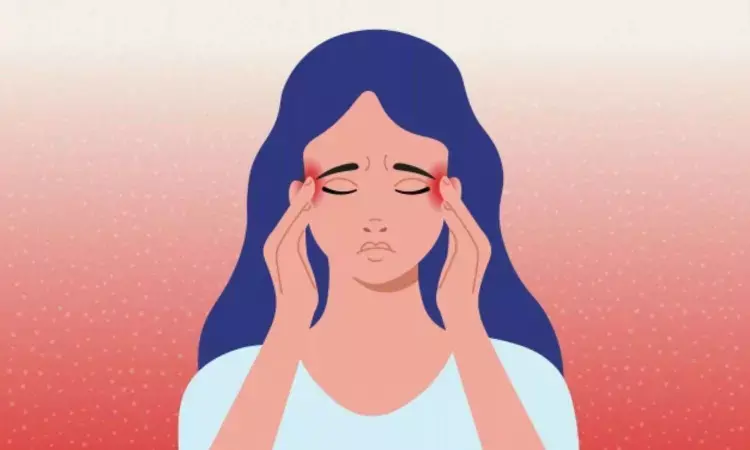- Home
- Medical news & Guidelines
- Anesthesiology
- Cardiology and CTVS
- Critical Care
- Dentistry
- Dermatology
- Diabetes and Endocrinology
- ENT
- Gastroenterology
- Medicine
- Nephrology
- Neurology
- Obstretics-Gynaecology
- Oncology
- Ophthalmology
- Orthopaedics
- Pediatrics-Neonatology
- Psychiatry
- Pulmonology
- Radiology
- Surgery
- Urology
- Laboratory Medicine
- Diet
- Nursing
- Paramedical
- Physiotherapy
- Health news
- Fact Check
- Bone Health Fact Check
- Brain Health Fact Check
- Cancer Related Fact Check
- Child Care Fact Check
- Dental and oral health fact check
- Diabetes and metabolic health fact check
- Diet and Nutrition Fact Check
- Eye and ENT Care Fact Check
- Fitness fact check
- Gut health fact check
- Heart health fact check
- Kidney health fact check
- Medical education fact check
- Men's health fact check
- Respiratory fact check
- Skin and hair care fact check
- Vaccine and Immunization fact check
- Women's health fact check
- AYUSH
- State News
- Andaman and Nicobar Islands
- Andhra Pradesh
- Arunachal Pradesh
- Assam
- Bihar
- Chandigarh
- Chattisgarh
- Dadra and Nagar Haveli
- Daman and Diu
- Delhi
- Goa
- Gujarat
- Haryana
- Himachal Pradesh
- Jammu & Kashmir
- Jharkhand
- Karnataka
- Kerala
- Ladakh
- Lakshadweep
- Madhya Pradesh
- Maharashtra
- Manipur
- Meghalaya
- Mizoram
- Nagaland
- Odisha
- Puducherry
- Punjab
- Rajasthan
- Sikkim
- Tamil Nadu
- Telangana
- Tripura
- Uttar Pradesh
- Uttrakhand
- West Bengal
- Medical Education
- Industry
Patients with reversible cerebral vasoconstriction syndrome may have long-term headaches

Only a history of prior headaches was linked to its incidence in roughly 50% of reversible cerebral vasoconstriction syndrome (RCVS) patients who experienced long-term headaches (LTH), says an article published in the Journal of Neurology.
The diagnosis of reversible cerebral vasoconstriction syndrome depends on the patient's clinical presentation because angiographic vasoconstriction is frequently not visible when symptoms first appear. The prevalence and predictors of long-term headaches are poorly understood, despite the fact that thunderclap headache is a distinguishing characteristic of RCVS. Neha Kumar and team conducted this study with two objectives to characterize the occurrence and determinants of LTH beyond the acute phase of RCVS and to assess the sensitivity and specificity of a recently created score (RCVS2) for vasoconstriction identification in a real-world clinical situation.
retrospective review of all patients who received an RCVS clinical diagnosis at a tertiary institution between 2017 and 2021 LTH (defined as at least one episode present at more than 6-months follow-up requiring medication) was evaluated in relation to demographic parameters, medicines, comorbidities, imaging features, and demographic factors. Based on predetermined cutoffs (certain 5, negative 2), the connection between the RCVS2 score and angiographic vasoconstriction was separately studied. Its sensitivity, specificity, and negative and positive predictive values were then calculated.
The key findings of this study were:
55 patients, aged 50.5 ( 13.7) years; 75% of them were female.
Only a past history of headaches was substantially related with LTH in 25 (49%) of the individuals who developed LTH.
The RCVS2 score and angiographic vasoconstriction were shown to be significantly correlated; the sensitivity, specificity, positive and negative predictive values were 64%, 94%, 95%, and 58%, respectively.
In conclusion, regardless of the time of imaging, this study demonstrated a significant correlation between the RCVS2 score and the existence of radiographic vasoconstriction, indicating that the score may be a helpful diagnostic auxiliary tool. These results require external validation in more substantial, prospective, multicenter cohorts.
Reference:
Kumar, N., Kumar, S., Rocha, E., & Lioutas, V.-A. (2022). Vasoconstriction and long-term headache in reversible cerebral vasoconstriction syndrome. In Journal of Neurology. Springer Science and Business Media LLC. https://doi.org/10.1007/s00415-022-11511-2
Neuroscience Masters graduate
Jacinthlyn Sylvia, a Neuroscience Master's graduate from Chennai has worked extensively in deciphering the neurobiology of cognition and motor control in aging. She also has spread-out exposure to Neurosurgery from her Bachelor’s. She is currently involved in active Neuro-Oncology research. She is an upcoming neuroscientist with a fiery passion for writing. Her news cover at Medical Dialogues feature recent discoveries and updates from the healthcare and biomedical research fields. She can be reached at editorial@medicaldialogues.in
Dr Kamal Kant Kohli-MBBS, DTCD- a chest specialist with more than 30 years of practice and a flair for writing clinical articles, Dr Kamal Kant Kohli joined Medical Dialogues as a Chief Editor of Medical News. Besides writing articles, as an editor, he proofreads and verifies all the medical content published on Medical Dialogues including those coming from journals, studies,medical conferences,guidelines etc. Email: drkohli@medicaldialogues.in. Contact no. 011-43720751


